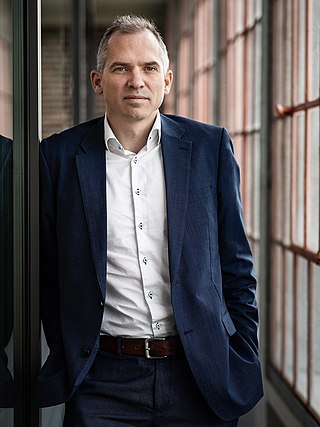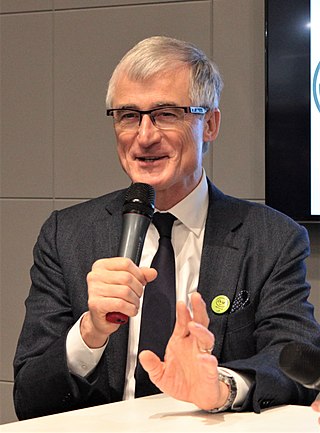Notes
- ↑ "Lijst van de gekozenen Vlaams Parlement" (PDF) (in Dutch). Flemish Parliament . Retrieved 18 July 2010.
Willy Segers | |
|---|---|
| Member of the Flemish Parliament | |
| Assumed office 7 June 2009 | |
| Personal details | |
| Born | 21 November 1958 Anderlecht, Brussels-Capital Region |
| Nationality | Belgian |
| Political party | N-VA |
| Residence | Dilbeek |
| Website | http://www.n-va.be/cv/willy-segers |
Willy Segers (born 21 November 1958 in Anderlecht) is a Belgian politician and is affiliated to the N-VA. He was elected as a member of the Flemish Parliament in 2009. [1]

Flanders is the Dutch-speaking northern portion of Belgium and one of the communities, regions and language areas of Belgium. However, there are several overlapping definitions, including ones related to culture, language, politics, and history, and sometimes involving neighbouring countries. The demonym associated with Flanders is Fleming, while the corresponding adjective is Flemish, which can also refer to the collective of Dutch dialects spoken in that area, or more generally the Belgian variant of Standard Dutch. The official capital of Flanders is the City of Brussels, although the Brussels-Capital Region that includes it has an independent regional government. The powers of the government of Flanders consist, among others, of economic affairs in the Flemish Region and the community aspects of Flanders life in Brussels, such as Flemish culture and education.

The minister-president of Flanders is the head of the Flemish Government, which is the executive branch of the Flemish Region and Flemish Community.

Belgium is a federal state comprising three communities and three regions that are based on four language areas. For each of these subdivision types, the subdivisions together make up the entire country; in other words, the types overlap.

The Open Flemish Liberals and Democrats is a Flemish liberal political party in Belgium. The party has been described as centre-right and has smaller factions within the party that have conservative liberal and social liberal views. The party is a member of the Liberal Group, Renew Europe, and Liberal International.
Vooruit is a Flemish social democratic political party in Belgium. It was known as the (Flemish) Socialist Party until 21 March 2021, when its current name was adopted.

The New Flemish Alliance is a Flemish nationalist, conservative and Eurosceptic political party in Belgium. The party was established in 2001 by the right-leaning faction of the centrist-nationalist People's Union (VU).
On 13 June 2004, regional elections were held in Belgium, to choose representatives in the regional councils of the Flemish Parliament, the Walloon Parliament, the Brussels Parliament and the German-speaking Community of Belgium. The elections were held on the same day as the European elections.

The Flemish Parliament constitutes the legislative power in Flanders for matters which fall within the competence of Flanders, both as a geographic region and as a cultural community of Belgium.

The Parliament of the Brussels-Capital Region, is the governing body of the Brussels-Capital Region, one of the three regions of Belgium. It is also known as the Brussels Regional Parliament.

The Flemish Region, usually simply referred to as Flanders, is one of the three regions of Belgium—alongside the Walloon Region and the Brussels-Capital Region. Covering the northern portion of the country, the Flemish Region is primarily Dutch-speaking. With an area of 13,626 km2 (5,261 sq mi), it accounts for only 45% of Belgium's territory, but 58% of its population. It is one of the most densely populated regions of Europe with around 500/km2 (1,300/sq mi).

Elections to the European Parliament were held in Belgium on 13 June 2004. The elections produced little overall change in the distribution of seats in the European Parliament among Belgium's many political parties. The two socialist parties improved their vote, while the Green parties lost ground. The Flemish nationalist party the Flemish Bloc registered the largest gains.

The Flemish Community is one of the three institutional communities of Belgium, established by the Belgian constitution and having legal responsibilities only within the precise geographical boundaries of the Dutch-language area and of the bilingual area of Brussels-Capital. Unlike in the French Community of Belgium, the competences of the Flemish Community have been unified with those of the Flemish Region and are exercised by one directly elected Flemish Parliament based in Brussels.
Vlaams Belang is a Flemish nationalist, Eurosceptic and right-wing populist political party in the Flemish Region and Brussels Capital Region of Belgium. It is widely considered by the media and political analysts to be on the political far-right, although it self-describes as right-nationalist and has tried to distance itself from the far-right label in recent years.

The Flemish Government is the executive branch of the Flemish Community and the Flemish Region of Belgium. It consists of a government cabinet, headed by the Minister-President and accountable to the Flemish Parliament, and the public administration divided into 13 policy areas, each with an executive department and multiple agencies.
Flemish Sign Language is a deaf sign language of Belgium. It is closely related to French Belgian Sign Language, but they are now generally recognized as distinct languages. VGT is estimated to include around 6,000 sign-language users.

Geert Albert Bourgeois is a Belgian politician of the New Flemish Alliance (N-VA), which he founded in 2001, who is currently serving as a Member of the European Parliament since 2019. He previously served as the Minister-President of Flanders from 2014 to 2019. Prior to this, he was a member of the federal Chamber of Representatives for the People's Union from 1995 to 2001, and then for the N-VA from 2001 to 2004. He has been involved in local and regional politics in Flanders since 1976.
Regional elections were held in Belgium on 7 June 2009 to choose representatives in the regional parliaments of Flanders, Wallonia, Brussels and the German-speaking Community of Belgium. These elections were held on the same day as the European elections.
Regional elections were held in Belgium on 25 May 2014 to choose representatives for the Flemish Parliament, Walloon Parliament, Brussels Parliament and the Parliament of the German-speaking Community. These elections were held on the same day as the 2014 European elections as well as the 2014 Belgian federal election.

The 2019 Belgian regional elections took place on Sunday 26 May, the same day as the 2019 European Parliament election as well as the Belgian federal election.